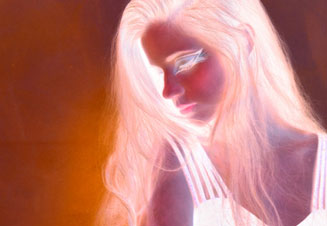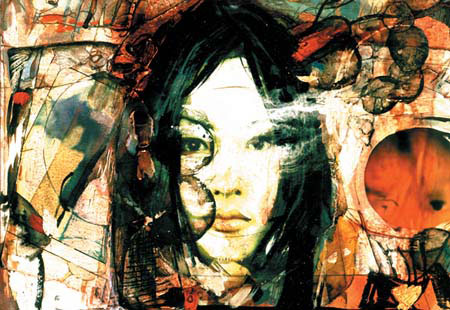
Though they’re advertised on license plates, billboards, and in roadside souvenir shops, I managed to overlook my first three New Mexico sunsets. My boyfriend kissed me under the fourth one. So, I do have something nice to say to my grandchildren about the time I dropped out of school and hitchhiked across the country. New Mexico sunsets are really pretty.
Also, there are plateaus. I grew up in a town where the ground was flat and I learned what the world outside was supposed to look like from a diagram that crammed every possible geological feature into one neatly-labeled color-coded box. River, hill, plain, valley, delta, fill-in-the-blank. The hardest vocabulary word was plateau, and judging from the awkward illustration, I suspected that these decapitated mountains had just been made up to give public school children something to memorize in Social Studies class. But here, in New Mexico, there are plateaus.
It’s early morning on sleepy I-25 South, surely one of the least-used stretches of highway in the country. The cars don’t come and, when they do come, they don’t stop. For hours we sit by the side of the road, waiting. Far away there are mountains, covered all over with trees. There’s no tree line. A manicured RV park lies on the other side of the freeway, before you get to the rusting piles of construction junk further on down. There are the green Interstate signs, always, and the same well-known logos floating in the sky. Texaco, McDonald’s, Pedestrians Prohibited.
The light is relentless, and a broken-limbed black umbrella serves as my parasol. I’m this sitting girl, held impossibly still by the heat. The shadow of the crippled umbrella falls on my dirty, sweaty clothes, graying out my patchwork sketch-palate jeans (ripped at the knees) and the faded yellow head-scarf that hides my greasy, unwashed hair. A dog barks. The bark crosses the freeway from the RV park and settles in my shade. I try to see myself from a driver’s eyes. A speck in the distance, slowly coming into focus. This skinny, raggedy, overgrown child, rained on by the New Mexico sun. A queer, enchanting sight. I could pass for a mirage. Maybe that’s why no one pulls over.
A few feet away, my boyfriend reads from our tattered, rained-on, duct-taped copy of War and Peace. In his other hand, he holds the sign: SOUTH TO ALBUQUERQUE. His long, matted hair drips over a black t-shirt plastered with a gray wolf howling up at a yellow moon near the left shoulder. On the bottom, it says “Texas.” It’s from a truck stop – three for $10.
My boyfriend feels me staring, looks up from the gnarled book (attacked by a pack of dogs after I finished it and before he started) and asks, “When was the last time you remember having fun?” An accusation. Our trip was supposed to be an adventure. We were supposed to be seeing the country.
Maybe he is still seeing something when he looks out there, but when he looks at me, he sighs. He sighs a lot. What does he expect? After all, I stood in the sunset. I let myself be kissed in a photographic style. A pink glow rose and fell upon my cheeks. That was only last night. Still, his fairytale is no longer my problem. Conjuring happiness is no longer my concern. What I wouldn’t give to become scenery.

“Fun?” I reply, “I like playing checkers.”
Occasionally, we play pennies against nickels on a hand-drawn board. We do this in air-conditioned fast food restaurants, filling the brightly-colored booths with our hiking packs, sleeping bags, water bottles. We sit and play checkers with our change until some stranger offers to buy us a pair of Value Meals. One such stranger actually complimented my boyfriend on me.
“Dude,” said the long-haired man, dropping some quarters on our table, “I hope you know how lucky you are to have such a beautiful companion on your awesome trip.”
Of course, he said he knew. You have to keep up appearances for the ones who wish they were you. If you’re a young couple hitchhiking together, half the people who help you do it because they wanted to be you in the 60s. But not everyone.
There was the man with the blue shirt and cigarettes who walked up to my table at Wendy’s, where I was making a friendship bracelet from embroidery floss. I was dressed in a threadbare hippy skirt and dirty red tank top from a California Goodwill store, and my boyfriend was in the bathroom.
“Hey, do you need a job?” asked the man.
“No, we’re just traveling, but thanks.”
“You need money?”
“We’re okay.”
“‘Cuz I could give you a job.”
I didn’t catch on. I didn’t want to be mean. “What kind of a job?”
He sat down in my boyfriend’s chair. “It’ll just take 15 minutes.”
“I’m not interested.” Staring at the thread in my hands.
“I’ll give you $50.”
“I’m not interested.” Staring at the floor.
I must’ve said it three times before he finally said okay and walked off. My boyfriend passed him on his way out, coming back from the bathroom.
“Don’t leave,” I told him, as soon as he reached the table. I meant that.
Checkers was a weak answer. I should have said, “When was the last time we had sex?” An accusation. We ran away for love.
Not only is he no longer able to view our sex life – in the tent, under overpasses, in truck stop showers – as a form of escapism, he avoids it specifically to make it easier for him to escape once this is over. It is one thing to say you want to leave someone you’re completely isolated with and fucking regularly. It is another thing to say you want to leave someone you’re sleeping with in close quarters and refusing to touch. Someone whom you’ve already touched in the ultimate way.
“It must be hard for you, doing this now,” he offers.
I want to say, “You have no idea.” I want to tell him all about it, how I cannot experience anything outside my own skin anymore. How even his ambivalence is dulled to me, like those famed New Mexico sunsets I daydreamed through for days. How every place we go is the same. The changes in landscape are miniscule compared to the changes happening inside.
I cannot tell him these things. I write them down in my hand-softened journals. I think about them, and the tears peek out. They sometimes, silently, fall. I open my mouth to tell him how I really feel, and the only sounds that will come are complaints. I complain constantly. I say that I am tired, I am dizzy, I am sick, I am hungry, I am afraid. I say these things even though they are obvious. We were supposed to be in love. We’ve been on the road for five months now, and we’ve finally passed the point where things could not possibly get better, and things cannot possibly get worse.
Today is the last day I could’ve gotten the pill. I think of sharp and silver things; my stomach turns.
We have $65; we need at least $300. The signage blitz isn’t working. TRAVELING AND HUNGRY, ANYTHING HELPS. It was for food, once. We were even happy, really, in the beginning. We flashed peace signs at the SUV’s waiting at busy intersections on their lunch breaks. We believed the stories we told the strangers who picked us up. But the charm wore off, even before we found ourselves worse off than broke.
We try to fake it now, this idea that our life before was the limited, slave-like one. The bullshit of the daily grind. Commercialism, television, academia, responsibility. Oh, to simply see. Oh, to be alive and free.
Maybe the intersection strangers know they’re being duped. Maybe they know that I’ve never appreciated a 99-cent corporate hamburger so much in my life. That whereas before, TV was merely a procrastination tool, now, I would give anything to be able to lose myself in a stupid sitcom. Not that there are even any intersections to try here. We’re in the middle of nowhere, trying to get to…
“Do you have a better idea?” he asks. “Do you want to try something else? Do you want to call your parents?”
No. My parents haven’t heard from me in months. I ran away for love.
When my mother was pregnant with me, she dreamt she gave birth to a kitten instead of a girl, and after bringing it home from the hospital, she accidentally left it in a dresser drawer, where it died. I haven’t dreamt of children or of cats, but I’ve dreamt of becoming huge. I am scared I will just wait and wait, until I’ll have no choice. The highway is no place for children.
I also dreamt of tearing open chickens. And I dreamt that a man picked us up in his car and told us that he knew that there were people like us, people with our very names, but he did not know that we were those people. He told me the version of my boyfriend that he knew cared for me so much more than for anything else in the world. But my real boyfriend, who sat next to me in the dream, only snickered.
I want to rest. I want to sleep in. I want to eat something that isn’t from the 99c menu, that isn’t peanut butter sandwiches or oatmeal. I want to get away from the sun. I want to wipe out the red, the orange, the yellow. These New Mexico colors are everywhere: on the ground, in the sky. My tan is spattered with this paint. I am burning; I feel like I’m going to vomit up a sun-baked baby.
I’m sitting on a rolled up sleeping bag. He’s sitting on his pack. A Jeep just passed us by, with talk radio spilling out its windows. If I stood up, I would fall down. One of the floating signs says there’s a Holiday Inn at the next exit. I want. Our water is tinted with Hawaiian Punch, from the soda fountain where we filled up our dented plastic bottles last. It tastes bad and I don’t want to drink it, but I’m so thirsty and my yellow piss says I’m not drinking enough.
I take down the umbrella to write in my diary. The sun squints my eyes and muddles my thoughts. My nose is stinging. My arms are stinging. Sweat drips slowly down my neck, leaving furrows in the dirt. Next to me on the concrete shoulder are a small pelt and a smear that used to be an animal. On the entrance ramp, I saw a mummified dog, the grotesque version of those animal skins that sleep in the parlors of the rich, with their heads still on. It occurs to me that if I never moved from this spot, the highway’s next rug could be me, the fried remains of a girl who ran away for love, climbed her first plateau, and died trying to see the country.
Such a death is too pure for me. I am not so idealistic as I used to be. Eventually, I will get up. Eventually, I will come down. I will get an abortion and I will get an apartment. I will let him leave me. It will be hard, but I will do it. I will live to tell the tale. New Mexico sunsets are pretty.
In The Fray Contributor
Dear Reader,
In The Fray is a nonprofit staffed by volunteers. If you liked this piece, could you
please donate $10? If you want to help, you can also:







